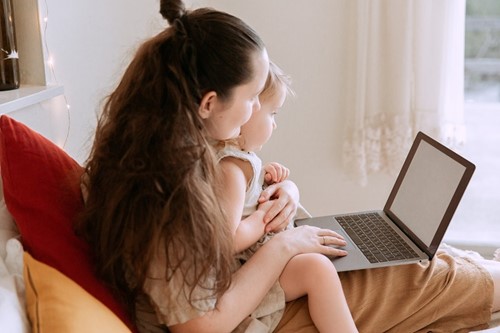Toddler Screen Time – How much is too much?

Leading expert-led organisation specialising in early years and nutrition - the Infant & Toddler Forum – shares helpful information on managing screen time in toddlers.
In today’s digital age, it is no surprise that the amount of screen time suitable for children is a highly debated topic, with the subject regularly dominating media headlines – particularly now we are in the midst of lockdown due to the coronavirus.
Children are spending more time than ever before immersed in screens from a very young age; this includes time spent watching television, playing a video game, or using an electronic device with a screen (such as a smartphone or tablet). While the evidence is still limited as to the effects, it is thought that screen time affects sleep, interactive play, and obesity – but it is not yet clear which type of screen time and when screen time might have the most impact.
Here we examine the evidence and aim to provide clarity on how much is too much when it comes to screen time.
How screen time affects sleep, play, and obesity: The evidence
Sleep
There are several studies that show that longer screen use during the day is associated with sleep problems in children.1 One study found that for each hour of touchscreen use, there was roughly a 15-minute decrease in the amount of sleep, and it also took children longer to go to sleep.2 While the evidence is still limited, the overall picture seems to be that there are indeed links between screen use and sleep, even in toddlers, but the reasons for this are not yet fully understood.
Play
Currently, there is very little evidence showing that screen time displaces activity time in children. A recent study looking at children followed from 3 weeks to 2 years, separated parents into two groups – a responsive parenting group, where screen time and television exposure were reduced – and a control group. The study revealed that the reduction in screen time and television exposure did not prove an increase in the frequency or amount of play amongst the children.3
Obesity
In older children, foods eaten during passive screen watching are more likely to be calorie-dense ‘snack foods’. Research also shows that food responsive children, who are at risk of obesity, will eat more whilst passively watching programmes, especially those that include food advertisements.4,5 Although there is little evidence to support this observation in toddlers and pre-school children6, the Avon Longitudinal Study of Parents and Children (ALSPAC) study showed that three-year-olds who watched more than an average of an hour of TV or DVDs each day were more likely to become obese in later childhood.7 This finding is not related specifically to passive eating but could be a function of lower activity levels in these children.
What the guidelines say
The World Health Organization’s (WHO) recent guidelines on screen time recommend that infants up to 2 years of age should have no screen time; and that the maximum for a 2-year-old should be one hour.8
The Royal College of Paediatrics and Child Health (RCPCH) guidelines9 however, recommend that screen use should be restricted before bedtime and that parents should be aware of the risks of snacking whilst passively watching.10
Balancing the pros and cons and the need for more evidence
The recommendations to avoid screen use at bedtimes and mealtimes have cross-agency consensus and a small but growing body of evidence to support them. Broader recommendations to avoid screens below the age of 2 years and limit the daily screen time above that age are common, but evidence which shows the benefits of sticking to these limits is unclear. More evidence is also needed to establish whether the type of screen (traditional passive screen media like TV viewing, versus interactive touchscreen use), choice of programme (adult versus child-directed) and context of use (alone versus with a parent or sibling) have different outcomes in terms of health, fitness and cognition.
Top tips on managing toddler screen time
It can be difficult to know how to manage and improve your toddler’s screen time; here are our top tips for getting the most out of screen time use:
• Make screen time family time – Watch, interpret and play with your toddler as you share the screen together
• Choose the right kind of screen time – The nature of the screen time is equally as important as the length of screen time. Make sure that what your child is watching, playing and reading is high quality and safe
• Create “screen-free” zones at home -Including the bedroom and the time leading up to bedtime
• Encourage other activities such as physical activity – Children can easily grow dependent on technology for entertainment and should be encouraged to become involved in activities that don’t involve screens. Most toddlers enjoy active play, particularly with their parents and friends. The Department of Health recommends that children under the age of 5 are physically active for at least 3 hours every day. 11 Activities such as active play inside and outside – including playing in the park, walking upstairs, bouncing on a trampoline, dancing, running, walking to nursery, and other similar activities – all count and should be encouraged.
By Dr Gill Harris, Consultant Paediatric Clinical Psychologist
About the Infant & Toddler Forum
The Infant & Toddler Forum CIC is a not-for-profit organisation established over fifteen years ago and committed to giving every child the healthiest start in life. We are a group of leading experts from paediatrics, neonatology, health visiting, dietetics, and child psychology, specialising in early years nutrition and development.